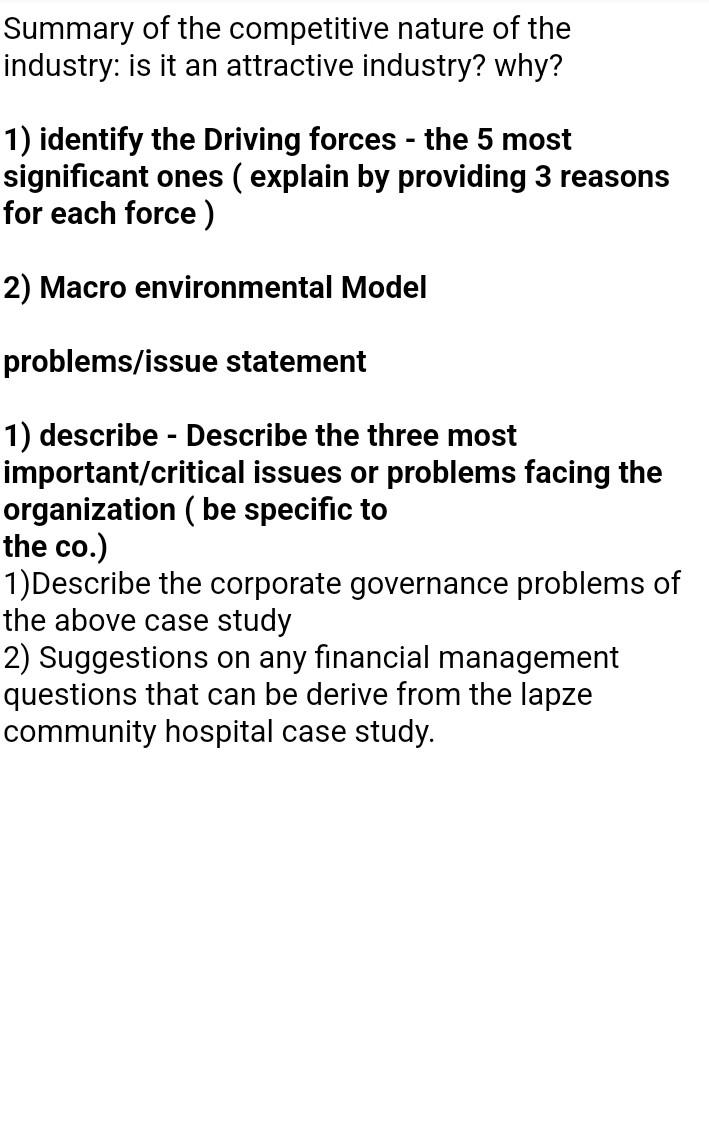Question
Korle-Bu Teaching Hospital, 37 Military Hospital and others. They have high demand for their services, and this can be attributed to the fact that they
Korle-Bu Teaching Hospital, 37 Military Hospital and others. They have high demand for their services, and this can be attributed to the fact that they have been operating for a long time in the country, thus they have gained goodwill and trust from their clients over the years.
b. It is important that other smaller hospitals develop an effective strategy that differentiates their services from that of their competitors to give them a competitive advantage in the market.
c. The market of healthcare in Ghana is not as diverse as other markets. Thus, the threat of substitutes will be based on the differentiating characteristics associated with each competitor that provides the same service.
d. The market has been dominated by the biggest teaching hospitals in the country over the years. A patient deciding between these hospitals could be based on the price range of receiving such services, the relationship established between the service provider and that of the client and based on how long the service provider has been operating.
e. Suppliers have very little power in the pharmaceutical industry. The raw materials for manufacturing drugs are commodity products in the chemical industry, which are available from numerous sources.
f. Most of the equipment used in manufacturing and research is available from multiple manufacturers. Suppliers usually offer multiple products to the manufacturer, which moderates pricing on rarer materials and unique equipment.
g. Buyers in Ghana's health-care sector have limited bargaining power. Customers may have some power due to the presence of other well-known health-care establishments. However, there is a cost associated with receiving treatment. Private hospitals would be the best alternative for higher- quality healthcare in Ghana, but they are out of reach for the typical Ghanaian.
h. In terms of pricing, public health care facilities would be the preferred option; however, clients may choose to pay a lower price for lower-quality treatments by purchasing a Health Insurance Scheme.
Page 11 of 12
i. Since this sector is dominated by a small number of enterprises, the threat of new companies entering the market is minimal. These large corporations have been in business for a long time and are well-known in the market. The Ghanaian health sector must prioritise policies that can lower costs with a more efficient system while simultaneously maximising value for customers in order for other firms to survive and compete.
SITUATIONAL ANALYSIS OF THE HEALTH SECTOR
The Government of Ghana supports the local manufacturing sector with financial incentives and the NHIS provides a basic care to majority of the population. The launch of the revised National Health Policy to provide a clear policy direction to Government in the provision of improved healthcare is another pillar of strength in the health delivery services in Ghana. Pharmaceutical manufacturing has been in place in the country for 75 years. This sector is being regulated by a well-equipped Food and Drugs Authority (FDA) to enhance drug surveillance.
Ghana is open to foreign direct investment. Investment in healthcare infrastructure, supported by international funding. Foreign Direct Investment in 2021 amounted to $1.3 billion. Therefore, there is an investment opportunity in the health sector. Domestic drug makers are also moving towards achieving World Health Organisation (WHO) qualification and GMP certification, supported by the government's policies. Ghana's evolving demographic and epidemiological profile will provide increased revenue earning opportunities for pharmaceuticals. The Government is willing to support indigenous drug manufacturers attain WHO qualification and GMP certification.
These favourable factors have been moderated by low incomes and limited out-of-pocket spending power. The Pharmaceutical market is also dominated by sometimes high-priced branded generics from India. The country is still highly dependent on pharmaceutical imports. The healthcare sector is also underdeveloped with low per capita health expenditure. In 2021 per capita expenditure was $75. The sector is also lacking a universal health insurance and limited expertise within the pharmaceutical sector resulting in high reliance on foreign imports. There is also no WHO nor GMP certified manufacturer. Worse of all there is either lax or no legal framework.
The sectors sustainability is impaired by the following factors; financial sustainability of the NHIS, prevalence of counterfeit drugs, mainly from abroad, which threaten to undermine sales from genuine pharmaceuticals, corruption remains a concern in all aspects of governance, recurrent bouts of currency weakness could erode consumer purchasing power and immigration

Summary of the competitive nature of the industry: is it an attractive industry? why? 1) identify the Driving forces - the 5 most significant ones (explain by providing 3 reasons for each force ) 2) Macro environmental Model problems/issue statement 1) describe - Describe the three most important/critical issues or problems facing the organization (be specific to the co.) 1)Describe the corporate governance problems of the above case study 2) Suggestions on any financial management questions that can be derive from the lapze community hospital case study
Step by Step Solution
There are 3 Steps involved in it
Step: 1

Get Instant Access to Expert-Tailored Solutions
See step-by-step solutions with expert insights and AI powered tools for academic success
Step: 2

Step: 3

Ace Your Homework with AI
Get the answers you need in no time with our AI-driven, step-by-step assistance
Get Started


